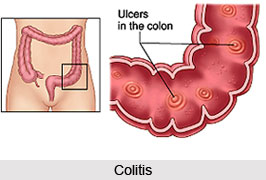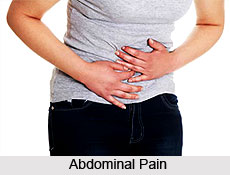 Common signs and symptoms of colitis include tenderness in the abdomen, pain, rapid weight loss, depression, aches and pains within the joints, fatigue, changes in bowel habits in increased frequency, fever; swelling of the colon tissue, erythema (redness) of the surface of the colon, ulcers on the colon which can bleed, mucus in the stool, blood in stool and rectal bleeding. Diarrhea also occurs along with Colitis, although some forms of colitis are constipation so the stool and bowel movements can appear normal. Some more symptoms of Colitis include gas, reflux, bloating, heartburn, indigestion, Gastro oesophageal reflux disease, cramps, urgency and many other uncomfortable aches in the gastrointestinal system.
Common signs and symptoms of colitis include tenderness in the abdomen, pain, rapid weight loss, depression, aches and pains within the joints, fatigue, changes in bowel habits in increased frequency, fever; swelling of the colon tissue, erythema (redness) of the surface of the colon, ulcers on the colon which can bleed, mucus in the stool, blood in stool and rectal bleeding. Diarrhea also occurs along with Colitis, although some forms of colitis are constipation so the stool and bowel movements can appear normal. Some more symptoms of Colitis include gas, reflux, bloating, heartburn, indigestion, Gastro oesophageal reflux disease, cramps, urgency and many other uncomfortable aches in the gastrointestinal system.
Common tests to reveal Colitis include X-rays of the colon, testing the stool for blood and pus, sigmoidoscopy, and colonoscopy. Additional tests include stool cultures and blood tests, including blood chemistry tests. A high erythrocyte sedimentation rate (ESR) is one distinctive method to find acute exacerbations of colitis. The main symptoms of Ulcerative colitis are bloody diarrhea connected with pain and cramps in the abdomen, fever and weight loss. Stools may be foul smelling and defecation could be painful. In India, the disease is often identified late. Doctors first confuse it for dysentery due to bacteria or amoebae.
The list of medical symptoms mentioned in various sources for Colitis is as follows
Diarrhea - Diarrhea is a very common symptom and almost everyone is familiar with a sudden bout of acute diarrhea. Although many people assume sudden diarrhea is "something you ate" (i.e. food poisoning), it is commonly caused by infectious diarrhea (usually a gastrointestinal virus) and also parasitic conditions such as giardia or crypto.
 There are also many other possible causes of diarrhea. In fact, even constipation or fecal impaction can cause diarrhea or fecal incontinence, as only watery feces passes from the blockage. Diarrhea can indicate a serious condition and can be potentially serious if it leads to dehydration. One should always seek prompt professional medical advice about any diarrhea or related symptoms. Chronic diarrhea refers in medical terms to repeated bouts of diarrhea over a prolonged period, rather than the common usage of "chronic diarrhea" to mean severe diarrhea. Chronic diarrhea is a symptom that can also indicate several serious medical conditions. These are the most important symptoms of Colitis.
There are also many other possible causes of diarrhea. In fact, even constipation or fecal impaction can cause diarrhea or fecal incontinence, as only watery feces passes from the blockage. Diarrhea can indicate a serious condition and can be potentially serious if it leads to dehydration. One should always seek prompt professional medical advice about any diarrhea or related symptoms. Chronic diarrhea refers in medical terms to repeated bouts of diarrhea over a prolonged period, rather than the common usage of "chronic diarrhea" to mean severe diarrhea. Chronic diarrhea is a symptom that can also indicate several serious medical conditions. These are the most important symptoms of Colitis.
Abdominal pain - Symptoms like stomach cramps, stomachache, abdominal discomfort, abdominal tenderness, heartburn, upper abdominal pain, kidney pain, bellyache or other types indicates acute abdominal pain. Abdominal pain causes can range from extremely severe life-threatening conditions like acute appendicitis, abdominal aneurysm to various less serious conditions like heartburn, reflux, gastroenteritis and so on. Any symptom of abdominal pain needs prompt professional medical advice. Sudden or very severe abdominal pain should be looked on as a medical emergency. It is often helpful to categorize abdominal pain into more specific types such as lower abdominal pain, upper abdominal pain, left abdominal pain, right abdominal pain, epigastric pain (pain behind the breastbone, such as in heartburn, reflux, or GERD), side pain, and other types of abdominal pain.
Abdominal pain is a very common symptom, and also common in children. Unfortunately, because there are so many possible causes of abdominal pain, and many cases are not serious, many cases of acute appendicitis are misdiagnosed each year as gastroenteritis or some other similar condition, especially in children and infants. Although appendicitis is a rare condition, it can be fatal. And there are many other severe conditions that may cause abdominal pain.
Mucus in stool - Mucus and blood in the stool may be a sign of rectal bleeding or gastrointestinal bleeding. Certain symptoms may lead to bloody diarrhea. Any bleeding symptom requires prompt professional medical advice.
The symptoms of Colitis should not be overlooked and appropriate treatment of this illness can be done at its best procedure.




